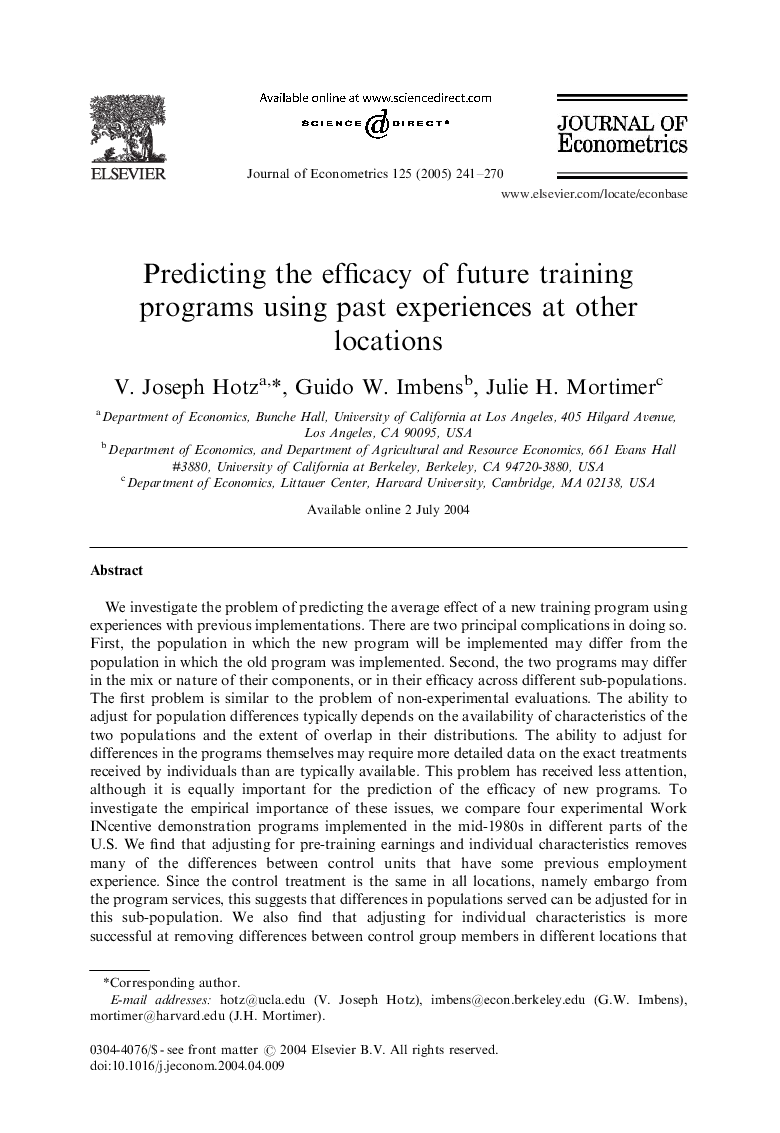| کد مقاله | کد نشریه | سال انتشار | مقاله انگلیسی | نسخه تمام متن |
|---|---|---|---|---|
| 9555355 | 1478587 | 2005 | 30 صفحه PDF | دانلود رایگان |
عنوان انگلیسی مقاله ISI
Predicting the efficacy of future training programs using past experiences at other locations
دانلود مقاله + سفارش ترجمه
دانلود مقاله ISI انگلیسی
رایگان برای ایرانیان
کلمات کلیدی
موضوعات مرتبط
مهندسی و علوم پایه
ریاضیات
آمار و احتمال
پیش نمایش صفحه اول مقاله

چکیده انگلیسی
We investigate the problem of predicting the average effect of a new training program using experiences with previous implementations. There are two principal complications in doing so. First, the population in which the new program will be implemented may differ from the population in which the old program was implemented. Second, the two programs may differ in the mix or nature of their components, or in their efficacy across different sub-populations. The first problem is similar to the problem of non-experimental evaluations. The ability to adjust for population differences typically depends on the availability of characteristics of the two populations and the extent of overlap in their distributions. The ability to adjust for differences in the programs themselves may require more detailed data on the exact treatments received by individuals than are typically available. This problem has received less attention, although it is equally important for the prediction of the efficacy of new programs. To investigate the empirical importance of these issues, we compare four experimental Work INcentive demonstration programs implemented in the mid-1980s in different parts of the U.S. We find that adjusting for pre-training earnings and individual characteristics removes many of the differences between control units that have some previous employment experience. Since the control treatment is the same in all locations, namely embargo from the program services, this suggests that differences in populations served can be adjusted for in this sub-population. We also find that adjusting for individual characteristics is more successful at removing differences between control group members in different locations that have some employment experience in the preceding four quarters than for control group members with no previous work experience. Perhaps more surprisingly, our ability to predict the outcomes of trainees after adjusting for individual characteristics is similar. We surmise that differences in treatment components across training programs are not sufficiently large to lead to substantial differences in our ability to predict trainees' post-training earnings for many of the locations in this study. However, in the sub-population with no previous work experience there is some evidence that unobserved heterogeneity leads to difficulties in our ability to predict outcomes across locations for controls.
ناشر
Database: Elsevier - ScienceDirect (ساینس دایرکت)
Journal: Journal of Econometrics - Volume 125, Issues 1â2, MarchâApril 2005, Pages 241-270
Journal: Journal of Econometrics - Volume 125, Issues 1â2, MarchâApril 2005, Pages 241-270
نویسندگان
V. Joseph Hotz, Guido W. Imbens, Julie H. Mortimer,